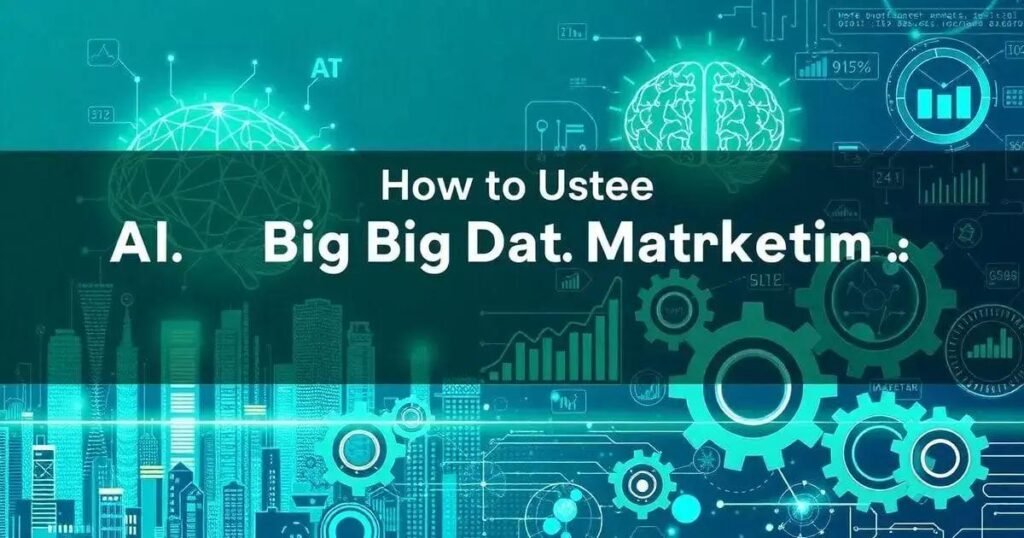As AI and big data continue to transform the way we live and work, it’s no surprise that marketers are looking for ways to harness their power for greater success.
The combination of AI and big data marketing offers a potent one-two punch for businesses looking to stay ahead of the competition.
By leveraging machine learning algorithms and vast amounts of customer data, marketers can gain unprecedented insights into customer behavior and preferences, tailor their messaging and campaigns for maximum impact, and drive real results.
In this post, we’ll explore the benefits of combining AI and big data for marketing success and provide actionable tips for getting started.
AI Marketing Revolution: How AI is Changing the Game
The integration of Artificial Intelligence (AI) in marketing has led to a significant shift in the way businesses operate. With AI, marketers can analyze vast amounts of data, identify patterns and trends, and make data-driven decisions.
AI-powered marketing tools can automate routine tasks, freeing up human resources for more strategic and creative work. Furthermore, AI algorithms can analyze customer behavior, preferences, and interactions to provide personalized experiences. The potential of AI in marketing is vast, and it’s essential to stay up-to-date with the latest developments to remain competitive.
Big data marketing is all about leveraging the power of data to drive business growth. By analyzing large datasets, marketers can gain valuable insights into customer behavior, preferences, and demographics.
These insights can be used to create targeted marketing campaigns, personalize customer experiences, and optimize marketing strategies. Big data marketing also enables real-time analysis and optimization, allowing marketers to adjust their strategies based on immediate results.
With the right tools and expertise, big data marketing can be a game-changer for businesses looking to stay ahead of the competition.
The integration of AI and big data is a powerful combination that can revolutionize marketing. By combining AI’s ability to analyze complex data with big data’s vast amounts of information, marketers can gain unparalleled insights into customer behavior and preferences.
AI-powered analytics can identify patterns and trends in big data, providing marketers with actionable insights to inform their strategies. The integration of AI and big data can also enable real-time analysis and optimization, allowing marketers to adapt to changing customer needs and preferences.
The future of marketing is all about harnessing the power of AI and big data to drive business growth. As AI continues to evolve, marketers will have access to increasingly sophisticated tools and technologies.
AI-powered marketing platforms will enable real-time analysis and optimization, allowing marketers to adapt to changing customer needs and preferences. The future of marketing will also see the rise of personalized experiences, fueled by AI-driven insights and big data analytics.
Marketers who stay ahead of the curve will be well-positioned to reap the benefits of this exciting new landscape.
While AI and big data marketing hold much promise, they also present several challenges. One common challenge is the need for significant data infrastructure and expertise.
Marketers may also struggle to integrate AI and big data into their existing marketing strategies. To overcome these challenges, it’s essential to start small, pilot-testing AI-powered marketing tools and gradually scaling up.
Additionally, marketers should prioritize data security and privacy, ensuring that customer data is protected and used ethically.
Big Data Marketing: Unlocking Insights for Better Results
By leveraging big data, marketers can gain a deeper understanding of their target audience, tailor their messaging and campaigns for maximum impact, and drive real results.
Big data marketing involves the analysis of large datasets to identify patterns, trends, and correlations that can inform business decisions. This approach enables marketers to create targeted campaigns, personalize customer experiences, and optimize marketing strategies for better ROI.
With the right tools and expertise, big data marketing can be a game-changer for businesses looking to stay ahead of the competition.
The combination of AI and big data is a powerful tool for marketers, enabling them to analyze complex data, identify patterns and trends, and make data-driven decisions.
AI-powered analytics can process vast amounts of data in real-time, providing marketers with actionable insights to inform their strategies. By integrating AI and big data, marketers can create personalized experiences, optimize marketing campaigns, and drive business growth.
The future of marketing is all about harnessing the power of AI and big data to drive business growth. As AI continues to evolve, marketers will have access to increasingly sophisticated tools and technologies.
AI-powered marketing platforms will enable real-time analysis and optimization, allowing marketers to adapt to changing customer needs and preferences. The future of marketing will also see the rise of personalized experiences, fueled by AI-driven insights and big data analytics.
While AI and big data marketing hold much promise, they also present several challenges. One common challenge is the need for significant data infrastructure and expertise.
Marketers may also struggle to integrate AI and big data into their existing marketing strategies. To overcome these challenges, it’s essential to start small, pilot-testing AI-powered marketing tools and gradually scaling up.
Additionally, marketers should prioritize data security and privacy, ensuring that customer data is protected and used ethically.
The integration of Artificial Intelligence (AI) in marketing has led to a significant shift in the way businesses operate.
With AI, marketers can analyze vast amounts of data, identify patterns and trends, and make data-driven decisions. AI-powered marketing tools can automate routine tasks, freeing up human resources for more strategic and creative work.
Furthermore, AI algorithms can analyze customer behavior, preferences, and interactions to provide personalized experiences.
Integrating AI and Big Data for Enhanced Marketing
The integration of AI and big data is a powerful combination that can revolutionize marketing. By combining AI’s ability to analyze complex data with big data’s vast amounts of information, marketers can gain unparalleled insights into customer behavior and preferences.
AI-powered analytics can identify patterns and trends in big data, providing marketers with actionable insights to inform their strategies. The integration of AI and big data can also enable real-time analysis and optimization, allowing marketers to adapt to changing customer needs and preferences.
With the right tools and expertise, integrating AI and big data can be a game-changer for businesses looking to stay ahead of the competition.
While AI and big data marketing hold much promise, they also present several challenges. One common challenge is the need for significant data infrastructure and expertise. Marketers may also struggle to integrate AI and big data into their existing marketing strategies.
To overcome these challenges, it’s essential to start small, pilot-testing AI-powered marketing tools and gradually scaling up. Additionally, marketers should prioritize data security and privacy, ensuring that customer data is protected and used ethically.
The integration of Artificial Intelligence (AI) in marketing has led to a significant shift in the way businesses operate. With AI, marketers can analyze vast amounts of data, identify patterns and trends, and make data-driven decisions.
AI-powered marketing tools can automate routine tasks, freeing up human resources for more strategic and creative work. Furthermore, AI algorithms can analyze customer behavior, preferences, and interactions to provide personalized experiences.
By leveraging big data, marketers can gain a deeper understanding of their target audience, tailor their messaging and campaigns for maximum impact, and drive real results. Big data marketing involves the analysis of large datasets to identify patterns, trends, and correlations that can inform business decisions.
This approach enables marketers to create targeted campaigns, personalize customer experiences, and optimize marketing strategies for better ROI.
The future of marketing is all about harnessing the power of AI and big data to drive business growth. As AI continues to evolve, marketers will have access to increasingly sophisticated tools and technologies.
AI-powered marketing platforms will enable real-time analysis and optimization, allowing marketers to adapt to changing customer needs and preferences. The future of marketing will also see the rise of personalized experiences, fueled by AI-driven insights and big data analytics.
The Future of Marketing: AI-Powered Insights and Strategies
The future of marketing is shaped by the convergence of AI and big data. As AI continues to evolve, marketers will have access to increasingly sophisticated tools and technologies.
AI-powered marketing platforms will enable real-time analysis and optimization, allowing marketers to adapt to changing customer needs and preferences.
Personalized Experiences
The future of marketing will also see the rise of personalized experiences, fueled by AI-driven insights and big data analytics.
By leveraging AI and big data, marketers can create targeted campaigns, optimize marketing strategies, and drive business growth.
Common Challenges and Solutions in AI and Big Data Marketing
As marketers incorporate AI and big data into their strategies, they may encounter several challenges. One common challenge is the need for significant data infrastructure and expertise.
Marketers may also struggle to integrate AI and big data into their existing marketing strategies. To overcome these challenges, it’s essential to start small, pilot-testing AI-powered marketing tools and gradually scaling up.
Additionally, marketers should prioritize data security and privacy, ensuring that customer data is protected and used ethically.
By addressing these challenges, marketers can unlock the full potential of AI and big data for better results.
Conclusion: The Path Forward for AI and Big Data Marketing
The adoption of Artificial Intelligence (AI) can bring numerous benefits to small businesses, from automating repetitive tasks to personalizing customer service and analyzing data.
The implementation of AI should be done gradually, identifying areas that can benefit immediately and conducting pilot projects to assess the efficiency of these solutions.
Success stories in different sectors show how AI can be a powerful tool to boost growth and improve operational efficiency.
With AI, small businesses can not only compete on equal footing with larger companies but also innovate and create new opportunities in the market.
Therefore, do not overlook the potential of AI to revolutionize your business.
Frequently Asked Questions about Artificial Intelligence in Small Business
How can task automation benefit my small business?
Task automation frees up your team from repetitive tasks, increasing productivity and allowing them to focus on more strategic tasks.
What tools can I use for data analysis?
There are various tools available, such as Google Analytics, Tableau, and Microsoft Power BI, that help collect and interpret valuable data.
What are chatbots and how do they improve customer service?
Chatbots are virtual assistants that can answer questions and resolve problems at any time, improving customer experience and freeing up your team.
How can I personalize the customer experience?
Through data analysis, you can understand customers’ preferences and offer personalized recommendations and promotions.
Why is customer feedback important?
Feedback is essential to identify areas that need improvement and adjust your strategy, ensuring customer satisfaction.
Is artificial intelligence accessible for small businesses?
Yes, there are various AI solutions that are accessible and scalable for small businesses, allowing them to improve efficiency and customer service.




